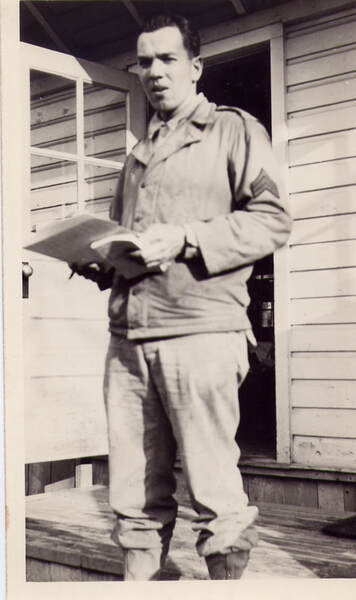Joseph Augustine Taney III

CPL in 603rd Engineer Camouflage Bn : Co D, 1st Platoon
ASN#33071122
Born 1916 in PA
Artist
County of residence at enlistment: Philadelphia County, PA
Other residence(s): Philadelphia, PA in 1942; Jenkintown, PA; Bethesda, MD in 1998
United States Army, European Theatre of Operations
Occupation before the war: authors, editors, and reporters
College education before the war: University of the Arts (Philadelphia) 4 years
Joseph Taney was born on April 2, 1916 in Media, Pennsylvania, one of four children. He attended what is now The University of the Arts in Philadelphia for two years. When he filled out his draft registration, on October 16, 1940, he was working for Howard Alber in Philadelphia. (Throughout his long life, Alber was an artist, graphic designer, teacher, gallery owner, ad man, and a mentor to many young artists, though he was only five years older than Taney. Like Taney, he served as an artist in World War II.) His obituary in The Washington Post says that he was working for an advertising design firm when he enlisted in 1941. (His enlistment form says he enlisted on June 17, but his PA Veterans Compensation form says December 7.) His enlistment form also reports his work category as "authors, editors, reporters."
He married Marguerite "Peggy" Meigs on June 9, 1943, by which time he had earned the rank of SGT. He was overseas with the Ghost Army from May 3, 1944 to July 2, 1945, and discharged from the Army on August 31, 1945. His brother John Charles also served in the military during World War II.
After the war he went back to Philadelphia, possibly back to his advertising work. He and Peggy would go on to have four children, and they were still living in Philadelphia in 1950, then later in Jenkintown, Pennsylvania.
In the mid-1950s, they moved to the Washington, DC area, and Joseph worked for six years for the US Information Agency as art director of its magazine America Illustrated, which was distributed in the Soviet Union. In 1961 he joined the faculty of the Corcoran School of Art in Washington, where he taught visual communications to young artists. By 1965, he was chairman of the advertising design program there. His obituary states that "among his projects, he helped students publish a 72-page magazine called Aura, which featured photographs of drawings, painting, sculptures and ceramics collected from art schools across the country." He also did freelance work as a commercial artist during this period.
In 1965, he took a job as art director for the National Geographic Society's special publications division. According to his obituary, "he was closely involved in the design of National Geographic's popular books on exploration, discovery and invention. He helped design book covers, hired illustrators and selected photographs and paper stock, among other duties."
Joe travelled to the Holy Land three times to create a photo record of where Jesus walked--no buses, no telephone lines, no soldiers with Uzis. According to his son, Bob Breeden, Joe’s boss at the Geographic, said it was one of the most comprehensive photo essays of any subject he had ever seen. (Those slides are now in the libraries of Catholic and Georgetown Universities.)
His son says that he was “a lifelong Catholic. Not preachy, but just quietly devout.” He tells a story to illustrate this. “On the Sunday before the March on Washington in August of 1963, the parish priest told the congregation in suburban Washington, DC that there would be a bus leaving the church on the day of the march. On that day, there were three people on that bus. The priest, the bus driver, and my dad.”
He retired in 1975 from both Corcoran and National Geographic.
In 1985, his wife Peggy died, and the following year he married Helen Gallagher Pyne, the mother of seven children, expanding his family dramatically! They lived in Bethesda, MD where he was a Eucharistic Minister with the Catholic Church of the Little Flower. He also served food and helped with the administration of the Zacchaeus Kitchen in Washington, and raised money for the Alliance for Communities in Action, which operates a school for the poor in Nicaragua.
He died of a heart attack on April 11, 1999, and is buried at St. Gabriel Cemetery in Potomac, Maryland.
Sources:
1940 Draft Card
1941 enlistment record
1943 Philadelphia Inquirer article about marriage
https://www.newspapers.com/image/171422283/?terms=joseph%2Btaney
1950 PA WW2 Veterans Compensation Application
1959 USIA Staff List
1965 Ad for Corcoran School of Art
1999 Find a Grave record
https://www.findagrave.com/memorial/11506329/joseph-augustine-taney
1999 Washington Post obituary